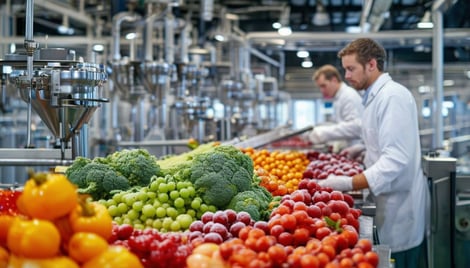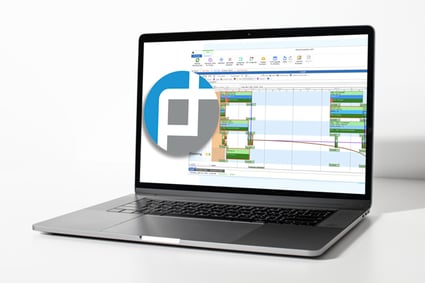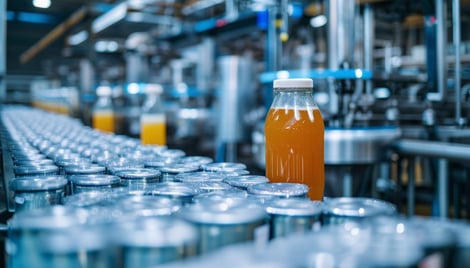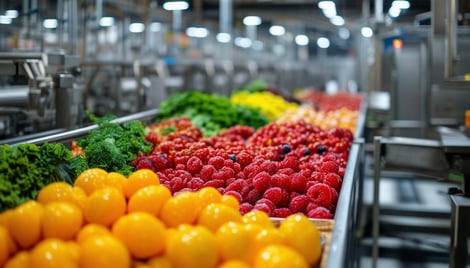Scheduling for Seasonal Variability in Food & Beverage Manufacturing
Seasonal demand fluctuations, driven by factors such as holidays, weather changes, and consumer trends, can challenge even the most experienced production schedulers. Successfully navigating these challenges requires robust planning, real-time adaptability, and seamless integration of advanced scheduling tools like PlanetTogether with enterprise systems such as SAP, Oracle, Microsoft, Kinaxis, or Aveva.

Understanding the Challenge of Seasonal Variability
Seasonal variability can manifest in several ways:
Surges in Demand: Holidays and events like Thanksgiving, Christmas, or summer barbecues often lead to spikes in product demand.
Shifts in Consumer Preferences: Seasonal preferences, such as pumpkin spice products in the fall or ice cream in the summer, require production agility.
Supply Chain Disruptions: Weather-related events and seasonal harvests can impact the availability of raw materials.
Labor Constraints: Seasonal hiring or workforce availability may influence production capacity.
Production schedulers must balance these variables while maintaining efficiency, minimizing waste, and meeting customer expectations.

The Role of Advanced Scheduling Tools
Modern manufacturing facilities rely on advanced scheduling tools to handle the complexities of seasonal variability. PlanetTogether, a powerful Advanced Planning and Scheduling (APS) software, is particularly well-suited for the food and beverage industry. When integrated with enterprise systems such as SAP, Oracle, Microsoft Dynamics, Kinaxis, or Aveva, PlanetTogether offers capabilities that transform scheduling into a strategic advantage.
Here’s how:
Dynamic Scheduling Adjustments
PlanetTogether enables production schedulers to create dynamic schedules that can be adjusted in real-time. When integrated with SAP or Oracle, the software provides immediate visibility into inventory levels, order statuses, and supply chain disruptions. This allows schedulers to react swiftly to changes in demand or supply.
For example, if a sudden heatwave drives up the demand for bottled water, the integrated system can prioritize production shifts and optimize resource allocation to meet the surge.
Scenario Planning and Forecasting
Integrated systems empower schedulers with predictive analytics and scenario planning. By leveraging data from systems like Kinaxis or Aveva, PlanetTogether can simulate various production scenarios based on historical data, current market trends, and seasonal forecasts. This helps schedulers prepare for high-demand periods while minimizing overproduction during slower seasons.
For instance, a scheduler can model different production plans for the holiday season, comparing the impact of increased overtime, additional shifts, or temporary labor on overall efficiency and costs.
Improved Collaboration Across Departments
Effective scheduling requires collaboration between production, procurement, and sales teams. Integration between PlanetTogether and enterprise systems like Microsoft Dynamics ensures that all stakeholders have access to the same data. This eliminates silos and facilitates better decision-making.
Consider a scenario where a sales team secures a large order for seasonal products. With an integrated system, this information is instantly reflected in the production schedule, enabling quick adjustments to meet the order deadline without disrupting other commitments.
Waste Reduction and Sustainability
Seasonal variability often leads to inefficiencies, such as overproduction or raw material waste. PlanetTogether’s integration with Aveva’s advanced analytics tools can help identify waste patterns and optimize resource utilization. By aligning production schedules with actual demand, manufacturers can reduce excess inventory and improve sustainability metrics.

Strategies for Scheduling Success During Seasonal Peaks
To effectively manage seasonal variability, production schedulers can implement the following strategies:
Build a Flexible Workforce
Train a pool of temporary workers who can be deployed during peak seasons.
Use scheduling tools to optimize shift patterns and avoid employee burnout.
Leverage Historical Data
Analyze past seasonal trends to forecast demand more accurately.
Use PlanetTogether’s integration with SAP or Oracle to access comprehensive historical data.
Enhance Supply Chain Visibility
Integrate scheduling tools with systems like Kinaxis to monitor supplier lead times and raw material availability.
Collaborate closely with suppliers to ensure timely deliveries during peak seasons.
Adopt Just-in-Time Production
Utilize real-time data from integrated systems to implement just-in-time production strategies, reducing inventory holding costs.
Plan for Contingencies
Develop contingency plans for unexpected disruptions, such as machinery breakdowns or supply chain delays.
Use scenario planning tools in PlanetTogether to prepare for various “what-if” scenarios.
Scheduling for seasonal variability in food and beverage manufacturing is a complex but manageable challenge. By leveraging advanced scheduling tools like PlanetTogether and integrating them with enterprise systems such as SAP, Oracle, Microsoft, Kinaxis, or Aveva, production schedulers can transform seasonal challenges into opportunities for growth.
The key lies in preparation, adaptability, and collaboration. With the right tools and strategies, food and beverage manufacturers can not only meet seasonal demand but also enhance operational efficiency, reduce waste, and deliver exceptional value to their customers. Whether it’s a summer surge or a holiday rush, the right scheduling approach ensures that your production lines keep pace with market needs.
Are you ready to take your manufacturing operations to the next level? Contact us today to learn more about how PlanetTogether can help you achieve your goals and drive success in your industry.
Topics: PlanetTogether Software, Integrating PlanetTogether, Dynamic Scheduling Adjustments., Food and Beverage Manufacturing, Improved Collaboration Across Departments, Scenario Planning and Forecasting, Waste Reduction and Sustainability





















LEAVE A COMMENT